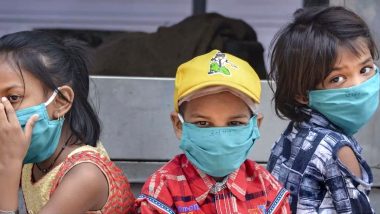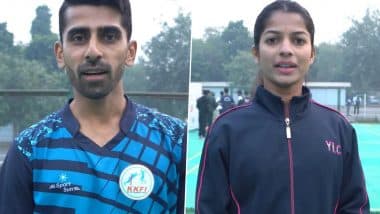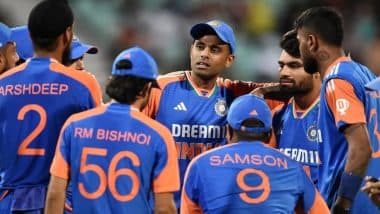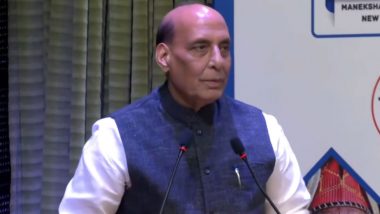New Delhi, April 30: The Union Health Ministry on Friday issued protocol for the management of COVID-19 in the paediatric age group. As per the Union Health Ministry, the majority of children with coronavirus infection may be asymptomatic or mildly symptomatic. Fever, cough, breathlessness/ shortness of breath, fatigue, myalgia, rhinorrhea, sore throat, diarrhoea, loss of smell, loss of taste etc are some of the common symptoms of coronavirus in children. India Records 3.86 Lakh Fresh COVID-19 Cases, 3,498 Fatalities in 24 Hours.
Children with COVID-19 infection may be asymptomatic, mildly symptomatic, moderately sick or severely ill. According to the Health Ministry, asymptomatic children are usually identified while screening and they do not require any treatment except monitoring for development of symptoms and subsequent treatment according to assessed severity. Children with Inflammatory Syndrome Had Mild COVID-19, Shows US Study.
Meanwhile, children with mild disease may present with sore throat, rhinorrhea, cough with no breathing difficulty. Some children may also have gastrointestinal symptoms. Such children do not need any investigations. These children can be managed at home with home isolation and symptomatic treatment. COVID-19 Revised Guidelines: Union Health Ministry Issues Revised Protocols for Home Isolation of Mild and Asymptomatic Coronavirus Patients.
Treatment of mild illness in home isolation is symptomatic:
- For Fever: Paracetamol 10-15 mg/kg/dose; may repeat every 4-6 hours
- For Cough: Throat soothing agents like warm saline gargles- in older children and adolescents
- Fluids and feeds: Ensure oral fluids to maintain hydration and a nutritious diet
- Antibiotics: Not indicated
Parents/ caretakers are required to maintain a monitoring chart including counting of respiratory rates 2-3 times a day when the child is not crying, looking for chest indrawing, bluish discolouration of body, cold extremities, urine output, oxygen saturation monitoring (handheld pulse oximeter) if feasible, fluid intake and activity level, especially for young children. Doctor or health care worker should be contacted regularly.
Management of children with Moderate COVID– 19 disease:
Children with moderate COVID – 19 disease may be suffering from pneumonia which may not be clinically apparent and respiratory issues. In this case, no lab tests are required routinely unless indicated by associated co-morbid conditions.
Treatment:
Children with moderate COVID-19 disease should be admitted to Dedicated Covid Health Centre or Secondary level Healthcare Facility and monitored for clinical progress. Maintain fluid and electrolyte balance. Encourage oral feeds (breastfeeds in infants); if oral intake is poor, intravenous fluid therapy should be initiated.
Children with moderate COVID – 19 disease should be administered:
- For fever: Paracetamol 10-15 mg/kg/dose. May be repeated every 4-6 hours. (temperature > 38oC, i.e. 100.4oF).
- Amoxycillin to be administered, if there is evidence/ strong suspicion of bacterial infection.
- For SpO2 below 94%, oxygen supplementation is required.
- Corticosteroids may be administered in rapidly progressive disease. It is not required in all children with moderate illness, specifically during the first few days of illness.
- Supportive care for comorbid conditions, if any.
Management of Children With Severe Covid-19 Disease:
Children with a SpO2 level of less than 90% are categorized as having a severe degree of Covid-19 infection. Such children may be having severe pneumonia, Acute Respiratory Distress Syndrome, Septic Shock, Multi-organ dysfunction syndrome (MODS), or pneumonia with cyanosis. Clinically, such children may present with grunting, severe retraction of the chest, lethargy, somnolence and seizure.
Such children should be admitted to Dedicated Covid Hospital/ Secondary/ Tertiary level healthcare facility. Few children may require care in High-dependency Unity (HDU)/Intensive Care Unit (ICU). They should be assessed for thrombosis, haemophagocytic lymphohistiocytosis (HLH), and organ failure.
Treatment For Severly Infected Children:
- Intravenous fluid therapy
- Randomised controlled trials of this drug in patients above 18 years of age has not shown significant survival benefits. An emergency use authorisation for children has been granted. Suggested doses if body weight > 40 kg is 200 mg on 1st day then 100 mg once daily for 4 days.
- Children may need organ support in case of organ dysfunction; e.g. Renal Replacement Therapy.
- Management of Acute Respiratory Distress Syndrome (ARDS): The principles of treatment are similar to that of ARDS due to any other underlying illness.
Management of Multisystem inflammatory syndrome in children and adolescents temporally related to COVID-19 (MIS-C):
A new syndrome with the name of the multisystem inflammatory syndrome has been described in children. Such cases are characterised by unremitting fever > 380 C, epidemiological linkage with SARS CoV – 2 and clinical features suggestive of Multi-System Inflammatory Syndrome.
Treatment of MIS-C
Children should be given Methylprednisolone 1 to 2 mg/kg per day, Intravenous Immunoglobulin 2 g/kg over 24 to 48 hours and Antimicrobials. The child needs appropriate supportive care, preferably in ICU. In absence of cardiac dysfunction, shock, coronary involvement, multi organs dysfunction, one may use steroids or IVIG (for details, see algorithm). Steroids have to be tapered over 2 to 3 weeks while monitoring inflammatory markers. For children with cardiac involvement, repeat ECG 48 hourly, repeat ECHO at 7 to 14 days and between 4 to 6 weeks and at 1 year if the initial ECHO was abnormal.
(The above story first appeared on LatestLY on Apr 30, 2021 04:36 PM IST. For more news and updates on politics, world, sports, entertainment and lifestyle, log on to our website latestly.com).



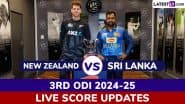



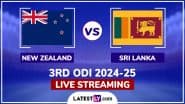



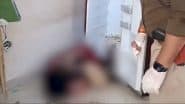

 Quickly
Quickly








